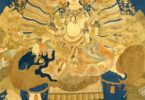《百喻经》
[The] Sūtra [Of A] Hundred Parables
(六一)梵天弟子造物因喻
[61] Parable [Of] Brāhma’s Disciple’s Created Things’ Cause
婆罗门众皆言:「大梵天王是世间父,能造万物。」
Brahmin disciples all say, ‘[The] Great Brāhma Heaven’s King is [the] world’s father, able [to] “create” [the] ten thousand things.’
[Note 1: The Great (Mahā) Brahmā Heaven’s King (大梵天王) (or as Baka [Crane] Brahmā) who resides in Great Brahmā Heaven (大梵天), the third lowest form heaven (色界天), mistakenly thought he created the world, with its things (and beings). Brahminism’s teachings (婆罗门教) centre around this deluded belief.]
造万物主者有弟子言:「我亦能造万物。」实是愚痴自谓有智。
That ‘creator’ [of the] ten thousand things had [a] disciple, saying, ‘I [am] also able [to] create [the] ten thousand things.’ [This] truly is [with] ignorance, calling oneself [to] have wisdom.
语梵天言:「我欲造万物。」
Speaking [to] Brāhma, saying, ‘I desire [to] create [the] ten thousand things.’
梵天王语言:「莫作此意,汝不能造。」
[The] Brāhma Heaven’s King spoke, saying, ‘[Do] not have this thought, [as] you [are] not able [to] create [them].’
不用天语便欲造物。
Not listening [to and] obeying [the] Heaven’s [King’s] words, [he] then desired [to] create things.
梵天见其弟子所造之物,即语之言:「汝作头太大,作项极小,作手太大,作臂极小,作脚极小,作踵极大,作如似毗舍闍鬼。」
Brāhma, seeing his disciple, his that created thing, then spoke [to] him, saying, ‘You made [the] head too big, made [the] neck extremely small, made [the] hands too big, made [the] arms extremely small, made [the] legs extremely small, made [the] heels extremely big, [with that] made like [a] piśāca ghost.’
[Note 2: Piśāca ghosts (毗舍闍鬼) are flesh-eating and shape-shifting demons.]
以此义当知,各各自业所造,非梵天能造,诸佛说法不着二边,亦不着断亦不着常,如似八正道说法。
With this meaning, [it] should [be] known, [that] each [and every] one [is by] personal karmas those created, not [who] Brāhma [is] able [to] create. All Buddhas speak [the] Dharma [that is] not attached [to the] two [extreme] sides, likewise not attached [to] nihilism, likewise not attached [to] eternalism, according with [the] Eightfold Noble Path, speaking [the] Dharma.
[Note 3: Our combination of evil karmas (恶业) and good karmas (善业) is our creator, not anything or anyone else.]
[Note 4: Basically, nihilism (断见) is the extreme (and wrong) view that after this life ends, there will be absolute nothingness, in terms of karmas (业) or rebirths (轮回). Eternalism (常见) is the other extreme (and also wrong) view that after this life ends, there will be permanent ‘somethingness’, in terms of an eternal heaven or eternal hell. There can be variations in beliefs of what is lasting or not.]
[Note 5: The Eightfold Noble Path (八正道) includes (1) Right Understanding (正见), (2) Right Thought (正思维), (3) Right Speech (正语), (4) Right Action (正业), (5) Right Livelihood (正命), (6) Right Diligence (正精进), (7) Right Mindfulness (正念) and (8) Right Concentration (正定).]
诸外道见断见常事已,便生执着,欺诳世间作法形像,所说实是非法。
All external paths, seeing ‘nihilistic’ [and] seeing ‘eternalistic’ matters already, then give rise [to] attachment. Cheating [and] deceiving [the] world [by] making [the] ‘Dharma’s forms, [with] that said [which] is truly not [the] Dharma.
Namo Amituofo : Translation and notes by Shen Shi’an
上个喻
Previous Parable:
见水底金影喻
[60] The Parable Of Seeing The Water’s Bottom’s Gold’s Reflection
https://purelanders.com/2023/09/29/60-the-parable-of-seeing-the-waters-bottoms-golds-reflection-from-the-sutra-of-a-hundred-parables
下个喻
Next Parable:
病人食雉肉喻
[62] The Parable Of The Sick Person Eating Pheasant Meat
https://purelanders.com/2023/09/30/62-the-parable-of-the-sick-person-eating-pheasant-meat-from-the-sutra-of-a-hundred-parables
全百喻
All Hundred Parables:
https://purelanders.com/baiyu





